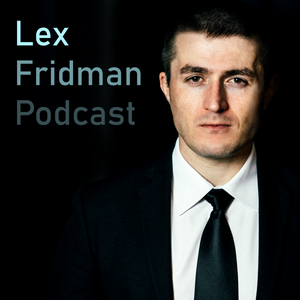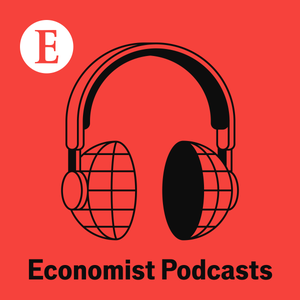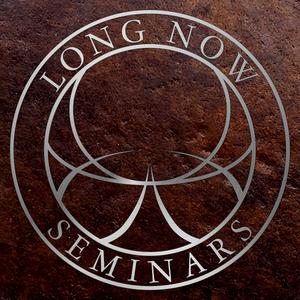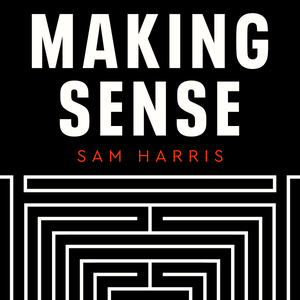
Long Now: Conversations at The Interval
The Long Now Foundation
A long-term thinking lecture series from The Long Now Foundation: these hour long talks are recorded live at The Interval, our bar / cafe / museum in San Francisco. Since 02014 this series has presented artists, authors, entrepreneurs, scientists (and more) taking a long-term perspective on subjects like art, design, history, nature, technology, and time. You can learn more about The Interval and this series at theinterval.org, where we have full videos of the talks on this podcast.
- 50 minutes 30 secondsThe Bureau of Linguistical Reality Performance Lecture: Alicia Escott, Heidi QuanteThe Bureau of Linguistical Reality is a participatory artwork facilitated by artist Alicia Escott and Heidi Quante which collaborates with the public to create new words for feelings and experiences for which no words yet exist. Recognizing the climate crisis is causing new feelings and experiences that have yet to be named, the project was created with a deep focus on these and other Anthropocenic phenomena. The Bureau views the words created in this process as also serving as points of connectivity: advancing understanding, dialogue, and conversations about the greater concepts these words seek to codify. This talk was an intimate sharing of The Bureau's findings from their decade long social art practice as well as a Word Making Field Session where Escott and Quante collaborated with participants to collectively coin a term together. Participants were encouraged to consider in advance their personal unnamed experience(s) of our changing world as well as their unique feelings for which they wish there was a word and to bring the diversity of their linguistic backgrounds to this conversation as the Bureau creates neologisms in all languages.1 May 2024, 8:49 pm
- 55 minutes 33 secondsIndigenous Sovereign Futures: Jonathan CorderoAlternative visions for social change rooted in the frameworks of capitalism and colonialism only reproduce contemporary structures of power. How can indigenous perspectives and knowledge inform the structural transformation necessary to improve the health of the natural world and of human communities? Dr. Cordero will discuss how indigenous epistemologies challenge the ideas and practices related to capitalism and colonialism and how the enhancement of indigeneity and sovereignty are critical to the maintenance of indigenous epistemologies. Insights drawn from the discourses on decolonization, settler colonialism, and epistemicide will be revealed throughout the presentation. Last, Dr. Cordero will share how indigenous perspectives and knowledge inspire work of the Association of Ramaytush Ohlone.19 April 2024, 7:19 pm
- 56 minutes 4 secondsEmbodied Economies: How our Economic Stories Shape the World: Denise HearnEconomic policy can seem abstract and distant, but it manifests the physical world – affecting us all. Our economic stories shape our systems, and they in turn shape us. What myths continue to constrain us, and how might new stories emerge to scaffold the future? This talk will explore concepts we often take as gospel: profits, competition, economic value, efficiency, and others -- and asks how we might reshape them to better serve planetary flourishing –today, and well into the future.7 March 2024, 6:27 pm
- 55 minutes 37 secondsHijacked Histories, Polarized Futures: Abby Smith RumseyAs authoritarianism continues to rise around the world, the stories we tell ourselves about our collective history become a battleground for competing visions of the future. Drawing extensively from Russian history in the 20th century, Rumsey offers a framework to discuss our current social and political tensions and how our increasing polarization could shape our future.22 November 2023, 12:27 am
- 31 minutes 42 secondsThe False Promise of Optimization: Coco KrummeCoco Krumme traces the fascinating history of optimization from its roots in America's founding principles, to its dominance as the driving principle of our modern world. Optimized models underlie everything and are deeply embedded in the technologies and assumptions that have come to comprise not only our material reality, but what we make of it. How did a mathematical concept take on such outsized cultural shape? Krumme's work in scientific computation made her aware of optimization's overreach, where she observed that streamlined systems are less resilient and more at risk of failure. They limit our options and narrow our perspectives. Optimal Illusions exposes the sizable bargains we have made in the name of optimization and asks us to consider what comes next.19 October 2023, 5:28 am
- 55 minutes 58 secondsResisting Dystopia: Becky Chambers, Annalee NewitzJoin us for a thought-provoking conversation between two Hugo award-winning science fiction authors, Becky Chambers and Annalee Newitz. Known for challenging classic science fiction tropes such as war, violence, and colonialism, both authors create vivid and immersive worlds that are filled with non-human persons, peace, and a subtle sense of hope. The authors will discuss what it means to take these alternative themes seriously, delve into their writing & world building process, and explore how science fiction can help us imagine new futures that can make sense of our current civilizational struggles.15 June 2023, 6:00 pm
- 58 minutes 2 secondsPsychedelics: History at the Crossroads: Ismail AliPsychedelics and other mind-altering substances have been used for thousands of years across the world in religious, spiritual, celebratory, and healing contexts. Despite a half century of a "War on Drugs" in the United States, there has been a recent resurgence in public interest in ending drug prohibition and re-evaluating the roles these substances can play in modern society. What can our several-thousand year history with these substances teach us about how they can be used in a modern society? What legal & cultural frameworks can be used to increase access to these substances, and what are the potential downsides of these frameworks? Ismail Ali works daily developing and implementing the legal and policy strategies that will define the next several decades of psychedelic access, and joins Long Now in an evening of exploring the deep history of psychedelics and what role they can play in our future. Ismail Lourido Ali, JD (he/him or they/them) is the Director of Policy & Advocacy at the Multidisciplinary Association of Psychedelic Studies (MAPS), and has been personally utilizing psychedelics and other substances in celebratory & spiritual contexts for over fifteen years. Ismail works with, is formally affiliated with, or has served in leadership or board roles for numerous organizations in the drug policy reform ecosystem, including Alchemy Community Therapy Center (formerly Sage Institute), Psychedelic Bar Association, Students for Sensible Drug Policy, Chacruna Institute, and the Ayahuasca Defense Fund.21 March 2023, 11:17 pm
- How to Invent Everything: Ryan NorthHow would someone fare if they were dropped into a randomly chosen period in history? Would they have any relevant knowledge to share, or ability to invent crucial technologies given the period's constraints? Ryan North uses these hypothetical questions to explore the technological and implicit knowledge underpinning modern civilization, offering a practical guide of how one could rebuild civilization from the ground up.1 March 2023, 12:09 am
- 56 minutes 49 secondsSpeculative Futures: Design Approaches to Foster Resilience and Co-create the Cities We Need: Johanna HoffmanUrbanist, researcher and writer Johanna Hoffman joins us to talk about speculative futures -- a powerful set of tools that can reorient urban development help us dream and build more resilient, equitable cities. Navigating modern change depends on imagining futures we’ve never seen. Urban planning and design should be well positioned to spearhead that work, but calculated rationale often results in urban spaces crafted to mitigate threats rather than navigate the unexpected, leaving cities increasingly vulnerable to the uncertainties of 21st century change. Long used in art, film, fiction, architecture, and industrial design, speculative futures offers powerful ways to counter this trend by moving us beyond what currently exists into the realms of what could be. Far from an indulgent creative exercise, speculative futures is a means of creating the resilient cities we urgently need.20 January 2023, 11:48 pm
- 1 hour 5 minutesDrinking for 10,000 Years: Intoxication and Civilization: Edward SlingerlandSee the full description of this talk on our new website: Edward Slingerland, "Drinking for 10,000 Years: Intoxication and Civilization".26 July 2022, 12:44 am
- 56 minutes 11 secondsSpace Debris and The Kessler Syndrome: A Possible Future Trapped on Earth: Creon LevitMore than one hundred million pieces of human-made space debris currently orbit our planet, most moving at more than 10,000 mph. Every year their number increases, creating a progressively more dangerous environment for working spacecraft. In order to operate in space, we track most of this debris through a patchwork of private efforts and government defense networks. Creon Levit spent over three decades at NASA, and is now the Director of R&D at Planet, a company that is imaging the earth everyday with one of the largest swarms of micro-satellites in the world. Creon will discuss the history of space debris, the way the debris is currently tracked, and how we might work to reduce it before we see a cascading effect of ballistic interactions that could render low orbit all but unusable.14 June 2022, 10:17 pm
- More Episodes? Get the App
Your feedback is valuable to us. Should you encounter any bugs, glitches, lack of functionality or other problems, please email us on [email protected] or join Moon.FM Telegram Group where you can talk directly to the dev team who are happy to answer any queries.
 Sinica Podcast
Sinica Podcast
 Lex Fridman Podcast
Lex Fridman Podcast
 Economist Podcasts
Economist Podcasts
 Long Now: Seminars About Long-term Thinking
Long Now: Seminars About Long-term Thinking
 Making Sense with Sam Harris
Making Sense with Sam Harris
 Conversations with Tyler
Conversations with Tyler